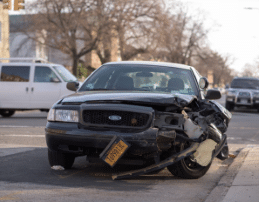6 Steps to Take if You’re Injured in a Car Accident

It’s a scenario no one ever wishes to encounter. You’re cruising along one of the most common locations for car crashes, and in a split second, everything changes. Metal clashes, tires screech, and amidst the chaos, you find yourself in the aftermath of a car accident. The adrenaline, shock, and whirlwind of emotions can be overwhelming. But having a blueprint of steps to take can be the beacon of light in such disorienting moments. Join in as this article unravels these steps, ensuring that if ever faced with this unfortunate event, you’re well-prepared to handle it.
1. Safety First: Secure the Scene
Picture a game of chess. The king, representing your safety, is of paramount importance. Before anything else, if you can, move to a safe location away from the traffic flow. If the car is in a drivable condition, pull it to the side of the road. Think of it as anchoring a boat amidst a storm; you seek stable ground amidst chaos. Additionally, turning on hazard lights or using road flares can help alert other drivers to the accident scene, reducing the risk of further collisions. Ensuring safety protects yourself and prevents additional accidents involving other motorists who may approach the scene.
2. Call for Help: Signal the Calvary
In moments of crisis, timely intervention is akin to rain in a drought. Dialing 911 ensures that medical help and law enforcement are on their way. Even if injuries seem non-existent or minor, it’s always better to have professionals assess the situation. It’s like having a safety net below a trapeze act; you hope not to need it, but it’s vital to have it there. Moreover, when calling 911, provide as much information as possible about the location, the number of vehicles involved, and any potential injuries. Quick communication with emergency services can expedite their response and assist those in need.
3. Document the Scene: Paint the Complete Picture
Once the immediate dangers are handled, morph into a detective of sorts. Capture photographs of the damage, the surroundings, skid marks, or traffic signals. Gather details from the other parties involved and any witnesses present. Just as a journalist collects facts for a story, you’re piecing together a comprehensive account of the incident. Documenting the scene can also be crucial for insurance claims and potential legal proceedings. It serves as tangible evidence to support your version of events and can help determine liability and compensation.
4. Exchange Information: Connect the Dots
Now, think of this step as exchanging business cards at a conference. Swap details with the other driver – name, contact details, insurance information, and license plate number. This information exchange paves the way for future conversations, be it with insurance companies or legal entities. Furthermore, it’s essential to remain calm and courteous during these interactions. Avoid engaging in arguments or admitting fault, as these actions can complicate matters later on. Stick to the facts and exchange necessary information to facilitate the claims process.
5. Seek Medical Attention: Listen to Your Body
Remember, the human body is incredibly resilient but also deceptively complex. Even if you feel fine post-accident, certain injuries might manifest later. Just as we often don’t feel the burn immediately after touching something hot, internal injuries or traumas can be silent but significant. Therefore, seeking a medical checkup is not just a step of caution but also of wisdom. Moreover, obtaining prompt medical attention creates a medical record of your injuries, which can be vital for insurance claims and personal injury lawsuits. It establishes a link between the accident and your injuries, strengthening your compensation case.
6. Consult a Legal Professional: Navigate with Expertise
Embarking on a legal journey post-accident without guidance is like venturing into uncharted waters without a map. Consulting a lawyer familiar with car accidents can be your compass, ensuring you take the right steps, safeguarding your rights, and potentially maximizing any compensation you might be entitled to. It’s the difference between wandering aimlessly and having a clear path charted out. Additionally, legal professionals can advise you on important aspects such as dealing with insurance companies, negotiating settlements, and pursuing legal action if necessary. They have the experience and expertise to navigate the complex legal landscape and advocate on your behalf, allowing you to focus on your recovery and well-being.
The aftermath of a car accident can be a vortex of confusion, pain, and uncertainty. But with the right steps, you can transition from being a disoriented victim to an empowered individual, actively taking control of the situation. Whether it’s ensuring your immediate safety or seeking legal counsel, every step is a stride toward resolution and recovery. So, while we hope you never face such a circumstance, being armed with knowledge ensures that if you ever do, you’re not lost in the storm but steering your ship towards calmer waters.


